General Secretary To Lam delivers a policy speech at the Russian Presidential Academy. (Photo: VNA)
Within the framework of his official visit to the Russian Federation and attendance at the 80th Anniversary of Victory Day in the Great Patriotic War, on May 10 (local time), General Secretary To Lam and the high-ranking Vietnamese delegation met and spoke at the Russian Presidential Academy of Public Administration and National Economy (RANEPA), also known as the Presidential Academy.
Gia Lai Newspaper respectfully introduces the speech of General Secretary To Lam at the Presidential Academy with the title "Cultivating the traditional friendship and comprehensive strategic partnership between Vietnam and the Russian Federation in the new era, for peace , cooperation and development":
Dear Mr. Vyacheslav Viktorovich Volodin, Chairman of the State Duma of Russia,
Dear Dr. Alekxey Gennadievich Komissarov, Rector of RANEPA Academy,
Dear Heads of the Russian Parliament and Government,
Dear veterans, intellectuals, experts of the Russian Federation and the former Soviet Union,
Dear all,
I am very pleased to visit and speak at the Russian Presidential Academy of Public Administration and National Economy (RANEPA) on the occasion of Russia celebrating the 80th anniversary of Victory in the Great Patriotic War. Once again, I would like to congratulate you.
Over the past few days, I and the members of the Vietnamese delegation have received a very warm and friendly welcome from the Russian leaders and people. Every time I come to Russia, I feel like I am returning home and meeting my family members.
Today, at RANEPA Academy, once again, I and the members of the Vietnamese delegation clearly felt the hospitality and open-mindedness typical of Russia.
For me, it is a great honor to share my feelings and thoughts at RANEPA Academy, the largest higher educational institution in Russia and all of Europe.
Many talents of Russia and the world have been trained and matured at this prestigious school.
More than 1,000 leaders of the Vietnamese Party and State, including General Secretary Nguyen Phu Trong, have studied here. I would also like to sincerely thank the RANEPA Academy Board of Directors for awarding me the extremely noble title of “Honorary Professor”.
Today's hall has many veterans, intellectuals, experts, researchers, former Russian and Soviet friends, who have stood side by side with the Vietnamese people in the struggle for national liberation and reunification in the past as well as in building and defending the Vietnamese Fatherland today.
I would like to extend my warmest greetings and heartfelt thanks to everyone! Hello Russia and dear Russian friends!
Ladies and gentlemen,
The victory of May 9, 1945 - the Victory in the Great Patriotic War - is one of the greatest milestones of the 20th century and of the entire history of mankind.
General Secretary To Lam meets and delivers a policy speech at the Russian Presidential Academy in Moscow. (Photo: VNA)
During the four fierce years of the world war, the Soviet Union became an indomitable bastion of progressive humanity. More than 27 million Soviet sons fell, including millions of Red Army soldiers who fought and sacrificed heroically.
Humanity will forever remember that priceless sacrifice, as the writer Olga Berggoltz said: “No one is forgotten, nothing is forgotten.”
The victory over fascism in 1945 ended one of the darkest chapters in human history, opening a new era of peace, liberation, construction and development.
That victory added faith, determination and inspiration to colonial peoples - including Vietnam - to rise up and fight for independence, to escape the domination of colonialism and imperialism.
The history of over a century has witnessed special ties between our two countries. As early as the 1920s, when the Vietnamese revolutionary movement was still in the stage of finding its way, Soviet Russia - the fruit of the great October Revolution - became a beacon illuminating the path to national liberation.
President Ho Chi Minh, the founder and leader of the Vietnamese revolution, came to Russia in 1923, studied at the Communist International, and approached Marxism-Leninism. The process of finding the “Russian Sun” of President Ho Chi Minh was expressed by poet Che Lan Vien as follows: 'Look, the Russian Sun is shining in the East. The bitter tree has borne sweet fruit… The thesis has come. And he cried. Uncle Ho's tears fell on the word Lenin… Lenin's thesis followed him back to his homeland Vietnam. The border is still far away. But Uncle Ho felt it was near.'
After the Communist Party of Vietnam was born in 1930, the relationship between the Vietnamese revolution and the international communist and workers' movement, centered on the Soviet Union, became increasingly close.
Many revolutionary predecessors of the Communist Party of Vietnam such as comrades Tran Phu, Le Hong Phong, and Ha Huy Tap also studied and trained in the Soviet Union and became outstanding leaders of the Vietnamese revolutionary movement.
Many Vietnamese officials and intellectuals continued to be sent to the Soviet Union to study and receive training in the fields of politics, military, science and technology, creating a core team for the struggle for independence and national construction later on.
During the resistance wars against French colonialism and American imperialism, the Soviet Union always gave Vietnam great, righteous, sincere and selfless support and assistance.
The Soviet Union provided Vietnam with a large amount of modern weapons and military equipment. Thousands of Soviet experts worked directly in Vietnam, sharing experiences and accompanying the Vietnamese army and people in the most difficult times.
Without Soviet weapons and equipment, it would have been difficult for us to shoot down the American B52 fortress; our troops might have had more difficulties, hardships, and sacrifices, and victory might have come more slowly.
Not only helping during the war, the Soviet Union was also a great friend in the cause of rebuilding and building Vietnam after the war.
During the most difficult years, the Soviet Union gave Vietnam comprehensive support from economy, culture, science-technology to education-training.
Hundreds of key economic-technical projects, industrial zones, mechanical and chemical industries, etc. were built with capital and technology from the Soviet Union. Vietnam's major research institutes, universities and hospitals all bear the mark of Vietnam-Soviet cooperation.
During his visit to the Soviet Union in 1956, Uncle Ho said: 'I love the Soviet people as I love my own compatriots.'
In particular, the Soviet Union received tens of thousands of Vietnamese students and postgraduates to study in the fields of engineering, medicine, economics, education, and defense.
This elite group of intellectuals, after returning, played an important role in the cause of industrialization and modernization of the country. The companionship, sharing, sincere, loyal, selfless help and noble solidarity of the Soviet Union in the past and the Russian Federation today are precious historical legacies for the two countries to continue to cultivate, build and develop the friendly and substantive cooperative relationship now and in the future.
Beyond the geographical distance, our two countries have great similarities in history, spirit, vision and values. Both peoples are 'in tune' in spirit, "share the same fate" to overcome challenges and "go together" on the path of development, above all, in comradeship and brotherhood. As the President (Vladimir Putin) assessed: "We share a heroic past in both work and combat."
In the world, there are few countries that always hold such deep, steadfast affection in the hearts of generations of Vietnamese people as the former Soviet Union and today's Russia.
Our fathers' generation and later generations of young people who grew up during the war and difficult days of the country always had a special attachment to Russia.
General Secretary To Lam delivers a policy speech at the Russian Presidential Academy. (Photo: VNA)
We studied Russian, read Russian literature, watched Russian films and sang Russian songs. Many Russian literary works became bedside books, contributing to the ideals and revolutionary will of many generations of Vietnamese youth.
War and Peace, How the Steel Was Tempered can be considered Vietnamese literary works. Tens of thousands of Vietnamese cadres and students studied and grew up in Russia and returned to contribute to their homeland, many of whom became key leaders of the Party and State of Vietnam.
The symbolic works of the great friendship between the two countries still retain their value today. In Vietnam, there are the Hoa Binh Hydroelectric Plant, Thang Long Bridge, Vietnam-Soviet Friendship Hospital, Lenin Monument in Nghe An (the hometown of President Ho Chi Minh) and in Hanoi. In Russia, there are Ho Chi Minh Square in Moscow and Vladivostok, Ho Chi Minh Monument in Ulyanovsk (the hometown of leader VI Lenin) and Saint Petersburg, and the Monument to Vietnamese International Volunteers in Moscow. All of the above connections have created “Russia in the heart of Vietnam” and “Vietnam in the heart of Russia.”
That is also the foundation, the solid basis for the traditional friendship and cooperation between our two countries.
Dear comrades and friends,
In the challenging context of more than four decades ago, Vietnam carried out the Doi Moi process. Overcoming many difficulties, Vietnam today has emerged as an open, dynamic economy, a bright spot in growth.
From a poor, underdeveloped economy heavily dependent on aid, Vietnam has now become one of the 35 largest economies in the world and the top 20 economies in the world in terms of attracting foreign investment and trade scale.
Regarding foreign affairs and international integration, from a besieged and isolated country, Vietnam has established diplomatic relations with 194 countries, actively participated in more than 70 multilateral forums and international organizations, established a network of 36 Strategic Partnership and Comprehensive Partnership frameworks, in which the Russian Federation is one of the first Comprehensive Strategic Partners (in 2012).
Those great and historic achievements, along with the recognition of international friends, have placed Vietnam at a new historical starting point, confidently stepping into a new era, with strategic and long-term orientations for the next stage.
In particular, our focus is to successfully achieve the goals of marking 100 years under the leadership of the Communist Party of Vietnam in 2030 and 100 years of national founding in 2045, while continuing to adhere to the goals of independence, self-reliance, self-confidence, self-reliance, national pride, multilateralization, diversification, for peace, cooperation and development, proactively and actively integrating comprehensively and deeply into the international community; at the same time, enhancing Vietnam's contributions and responsibilities in world politics, the global economy and human civilization.
We associate rapid and sustainable economic development with growth model innovation, improving quality, efficiency and competitiveness with science - technology, innovation, digital transformation and training of high-quality human resources as key driving forces.
Vietnam is accelerating the implementation of strategic development projects on energy infrastructure, transport infrastructure, and digital infrastructure, including high-speed railways, the North-South expressway, nuclear power plants, entering new fields such as the semiconductor industry and artificial intelligence, and building regional and international financial centers.
We are also promoting the streamlining and rearrangement of the State and local apparatus, along with breakthrough development of science and technology, innovation and proactive, active international integration, considering this as the "strategic trio" to carry out the key tasks of "Long-term stability - Sustainable development - Improved living standards."
Vietnam will continue to steadfastly and consistently implement its foreign policy of independence, self-reliance, multilateralization, diversification of relations, being a friend, a reliable partner, an active and responsible member of the international community; proactively and actively integrating deeply and comprehensively into the international community; and making more active and proactive contributions to world politics, the global economy and human civilization.
Vietnam always supports the settlement of disputes by peaceful means, in accordance with the United Nations Charter and international law.
At the same time, we consistently support and promote the maintenance of a free multilateral trading system based on the rules of the World Trade Organization (WTO), opposing the politicization of international economic relations and fragmentation of global trade, protectionism, unilateral economic sanctions and unfair competition.
Dear comrades and friends,
Vietnam's development path cannot be separated from the world. We clearly understand that Vietnam cannot achieve the above-mentioned goals without the pure international solidarity, valuable support and effective cooperation of the international community, including Russia. Consolidating and enhancing the effectiveness of the Vietnam-Russian Federation Comprehensive Strategic Partnership continues to be one of the top priorities in Vietnam's current foreign policy, meeting long-term interests, contributing to the development of each country, as well as enhancing the role of the two countries in each region and on a global scale.
In recent years, despite fluctuations in the world and regional situation, the relationship between the two countries has continued to be strongly promoted. Exchanges and contacts between the two countries have been very active, especially at the highest level with President Vladimir Putin's state visit to Vietnam in June 2024 and Prime Minister Mishustin's official visit to Vietnam in January 2025.
General Secretary To Lam and Chairman of the State Duma (Lower House) of the Russian Federation Vyacheslav Volodin and delegates attended the meeting and delivered a policy speech at the Russian Presidential Academy. (Photo: VNA)
Economic, trade and investment cooperation is gradually recovering, with trade turnover in 2024 reaching nearly 5 billion USD, an increase of 26.1% compared to 2023.
Oil and gas-energy cooperation continues to be an important area of cooperation between the two countries.
Defense and security cooperation is promoted with many diverse directions and aspects of cooperation, and is an important pillar of the relationship.
The two sides actively coordinate closely and support each other at multilateral forums. Cooperation in education-training, science-technology, culture, sports, tourism, and people-to-people exchange has been actively implemented.
Currently, more than 5,000 Vietnamese students are studying in Russia. The Vietnamese community in Russia continues to grow and makes an increasingly important contribution to the socio-economic development of Russia.
Meanwhile, Vietnam is one of the most favorite destinations for Russian tourists in Southeast Asia. Before the COVID 19 pandemic, our country was happy to welcome more than 650 thousand Russian tourists and in 2024, despite the shortcomings in air traffic, there were still more than 230 thousand Russian visitors to Vietnam.
The Vietnamese delegation and I are very pleased that during this visit, the two countries are expected to sign about 20 more agreements and memorandums of understanding on cooperation in many fields.
Ladies and gentlemen,
With the baggage of history and the present, our two countries are entering a new era, an era of epochal changes. Each of our countries is changing every day and the world is also witnessing unprecedented movements.
These epochal changes bring opportunities, advantages, as well as many difficulties and challenges to both our countries. However, difficulties are the source of innovation and strong growth, the driving force for our two countries to continue to accompany each other, promoting increasingly substantive and effective cooperation, for the future of our two peoples and for peace, stability and development in the region and the world.
With that approach, we and the Russian leaders discussed and proposed the following orientations to promote cooperation between our two countries:
First, promote delegation exchanges, consultations and dialogues regularly and substantially at senior and highest levels.
Second, enhance economic, trade and investment cooperation - the key areas of cooperation in the bilateral relationship. In particular, it is necessary to prioritize and facilitate the expansion of trade, investment and financial-credit relations in accordance with international law and the legal regulations of the two countries to promote the exchange of goods and services.
Along with that, it is necessary to expand cooperation in the fields of agriculture, forestry, fisheries, mineral exploitation and processing, industry, machinery manufacturing and energy.
Third, promoting defense and security cooperation, which plays a special role in the overall Vietnam-Russia relationship, promptly meets the demands of the current situation, while contributing to ensuring peace, stability and development in the region and the world.
Fourth, promote cooperation in science and technology, innovation and digital transformation, considering this a key area of cooperation in the relationship, including cooperation in basic science, information technology, artificial intelligence, automation, biomedical technology and renewable energy.
In the context of 2026 being the Vietnam-Russia Year of Science, Technology and Innovation Cooperation, the two countries need to effectively implement research cooperation projects in priority areas.
We attach special importance to strengthening cooperation in the field of nuclear energy, especially effectively implementing the project to build a Nuclear Science and Technology Research Center in Vietnam. The construction of a nuclear power plant is a high priority for Vietnam at present.
Fifth, promote cooperation in the fields of education and training, culture, arts, tourism, and people-to-people exchange. These are areas in which the two countries can expand and deepen, with unlimited scope for cooperation.
The two countries need to continue expanding the activities of the Vietnam-Russia Technical University Network to promote the training of high-quality human resources.
I highly appreciate the cooperation results between RANEPA Academy in implementing the Memorandums of Understanding with the Ho Chi Minh National Academy of Politics, the Academy of Public Administration, the People's Security Academy and recently the Hanoi Law University; I hope that RANEPA Academy will continue to expand cooperation with research institutes and universities in Vietnam, especially in the fields of public administration, international economics and international relations.
We need to continue to promote research and teaching of Vietnamese in Russia and Russian in Vietnam, including making full use of the potential of educational institutions in the two countries, including the Pushkin Institute of Russian Language in Hanoi and the Russian Center for Science and Culture in Hanoi.
I hope the two countries will soon promote the completion of the Vietnam Cultural House project in Moscow.
The two countries need to further expand tourism cooperation, including increasing the frequency of regular direct flights and charter flights, as well as simplifying travel procedures for citizens of the two countries.
The Academy's Rector presented General Secretary To Lam with the title of "Honorary Professor" of the Academy of Public Administration and National Economy under the President of the Russian Federation. (Photo: VNA)
At the same time, exchanges between ministries, sectors, localities, and cultural days of the two countries need to be conducted regularly as well as maintaining contact between mass media agencies, friendship associations, and social organizations.
Sixth, promote cooperation and close coordination at international and regional multilateral forums, including ASEAN, the United Nations and APEC.
The two countries need to continue promoting multilateralism, a fair and sustainable multipolar world order, in which Russia is an important pole, based on the fundamental principles of the United Nations Charter and international law; promote joint efforts of the international community to respond to non-traditional security challenges, including climate change, cyber security, and the prevention of transnational crimes.
Regarding the East Sea issue, Vietnam hopes that the Russian Federation will demonstrate its role more strongly towards the goal of maintaining peace, stability, security, safety and freedom of navigation in the East Sea, and continue to support the settlement of disputes by peaceful means in accordance with the principles of the United Nations Charter and international law, including the 1982 United Nations Convention on the Law of the Sea (UNCLOS).
At the same time, we hope that the Russian Federation will continue to support the strengthening of the central role of the Association of Southeast Asian Nations (ASEAN) in the Asia-Pacific regional architecture. Vietnam will strengthen close coordination with Russia to deepen the ASEAN-Russia Strategic Partnership, promote effective cooperation on the basis of the ASEAN-Russia Comprehensive Plan of Action for the 2021-2025 period and towards the 2026-2030 period.
Ladies and gentlemen,
The glorious history, great achievements of the country and people of Russia, as well as the proud development of the bilateral relationship have affirmed the special role and position of Russia towards Vietnam, including the important contributions of RANEPA Academy.
Generations of students, postgraduates and researchers at the Academy will certainly continue to be bridges promoting the great friendship between Vietnam and the Russian Federation.
I would also like to express my deep gratitude to Russian veterans, intellectuals, and experts who have devoted their love and support to Vietnam throughout the ages.
All are forever loyal and close friends, comrades and brothers of the Vietnamese people.
Following in the footsteps of previous generations, the young generation of the two countries today needs to be imbued with the noble international spirit applied in the close, loyal, and rare relationship between the people of Vietnam and the Russian Federation as well as the important significance of continuing to foster the solidarity, friendship, and close cooperation between the two countries in the new era.
In that spirit, I strongly believe that Vietnam and the Russian Federation will continue to accompany each other on the path towards wealth, prosperity, and people's happiness, and that the bilateral relationship will develop to a new height, commensurate with the historical and cultural stature of each country and the requirements of the times.
I wish you all health, happiness and success!
Thank you very much!
According to Hong Diep (Vietnam News Agency/Vietnam+)
Source: https://baogialai.com.vn/phat-bieu-cua-tong-bi-thu-to-lam-tai-hoc-vien-tong-thong-lien-bang-nga-post322598.html


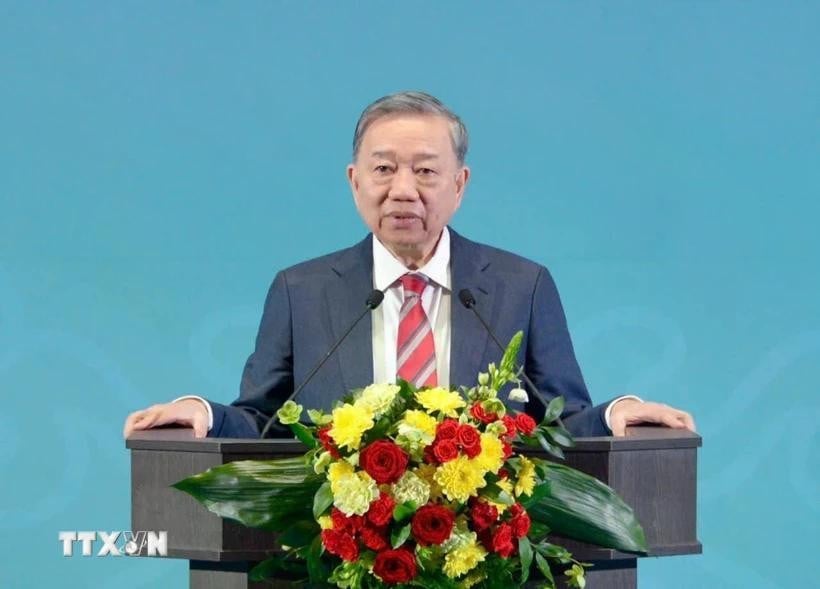
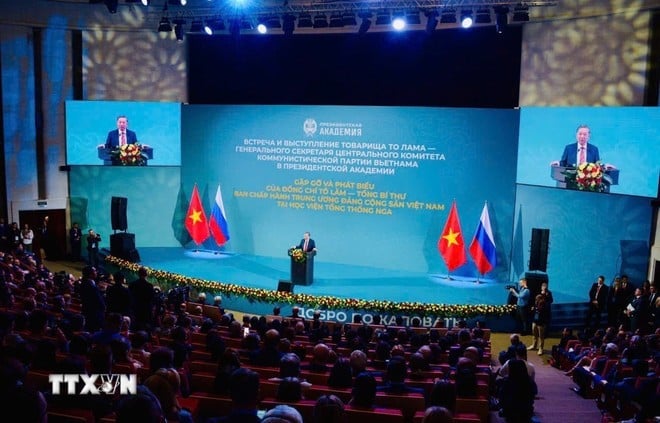
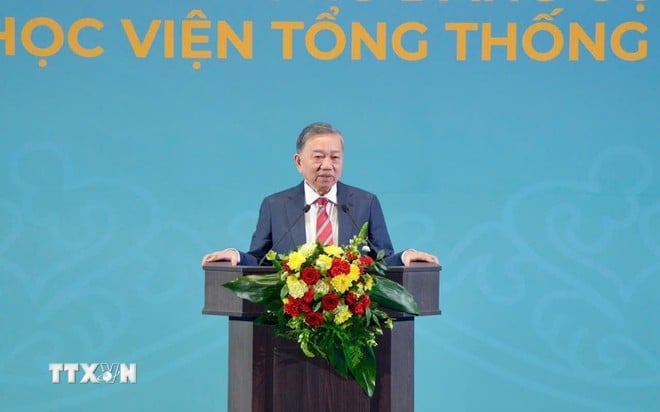
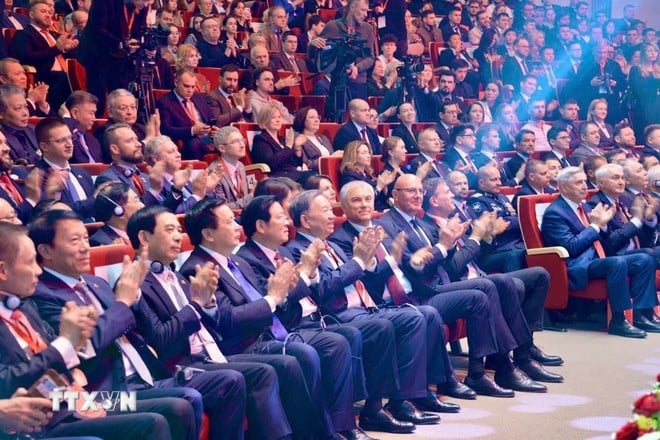
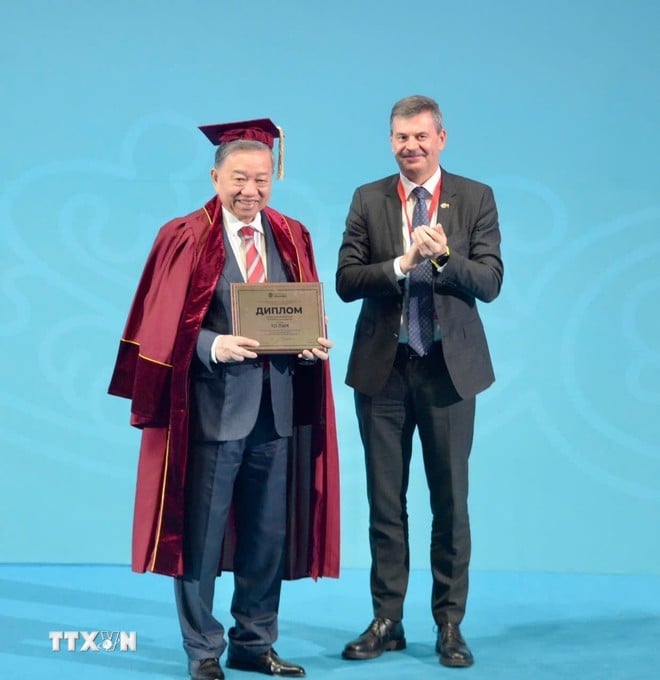
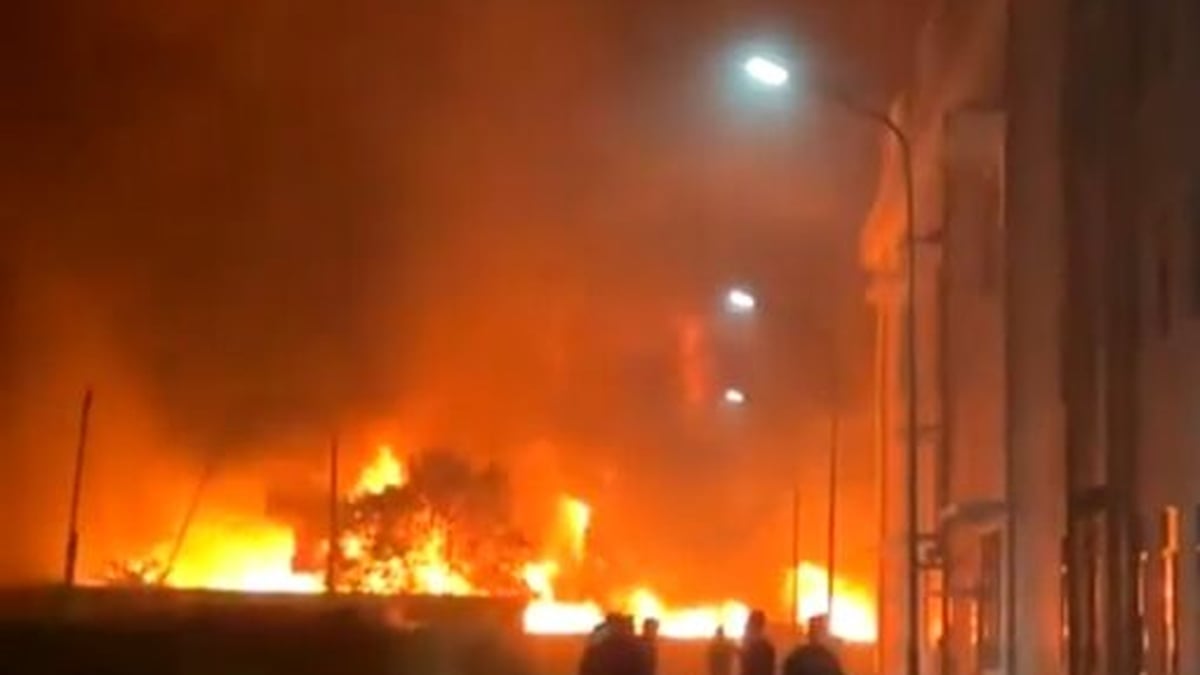
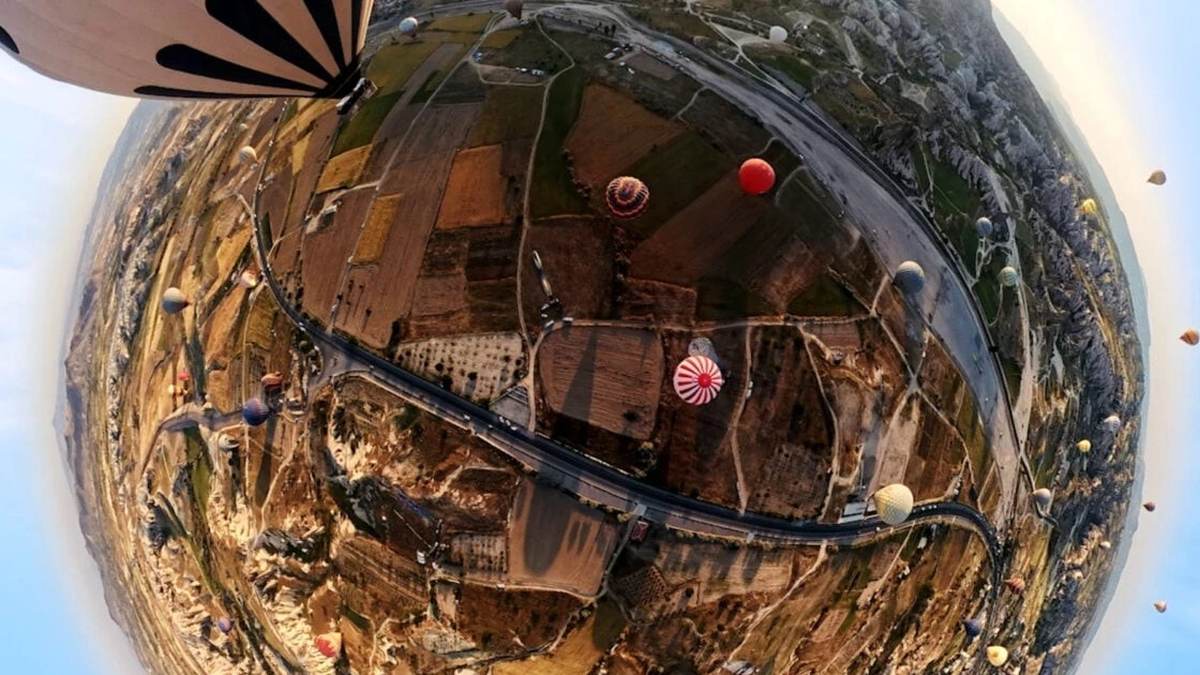
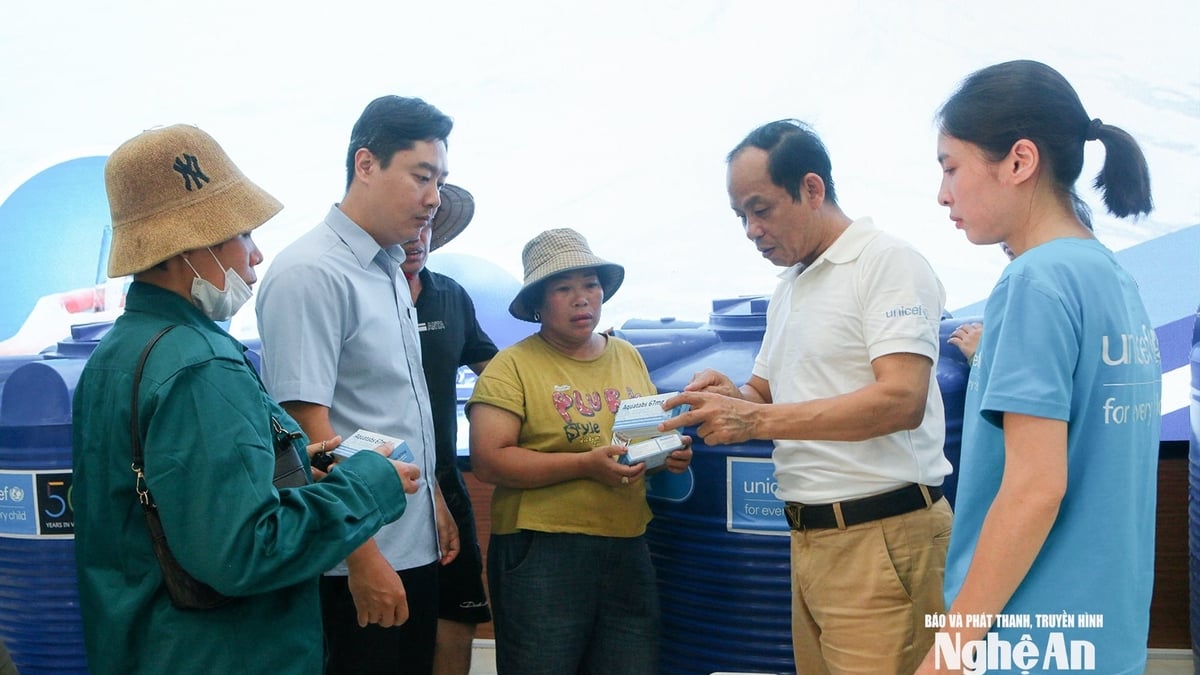

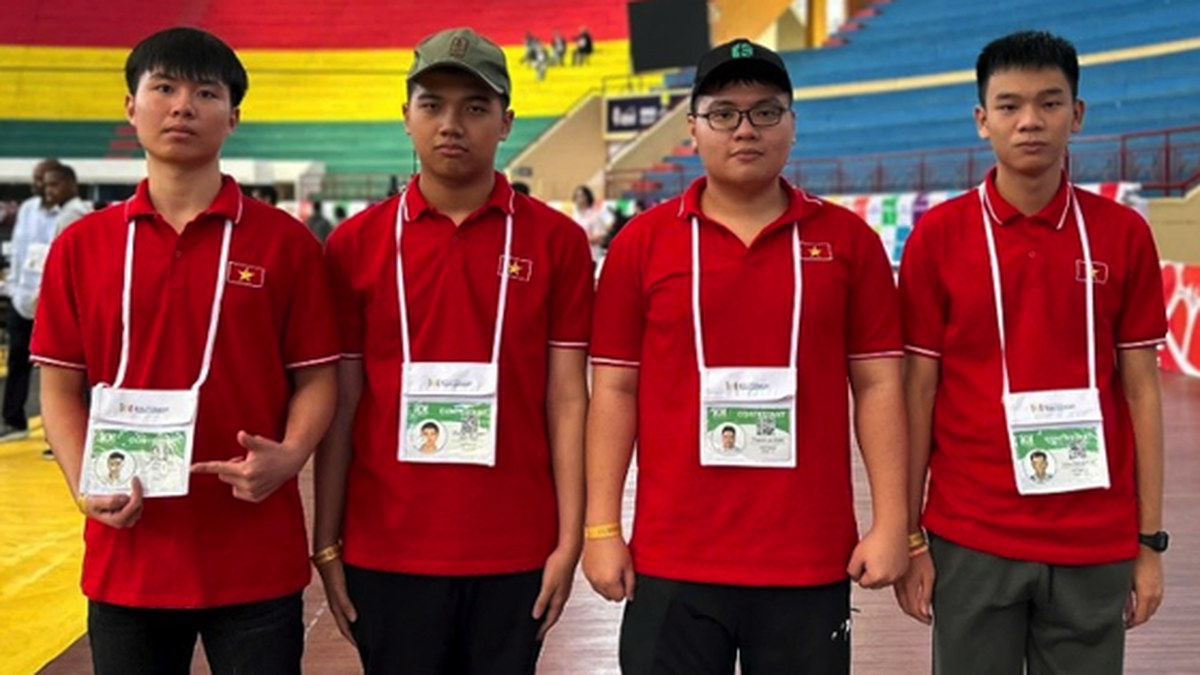
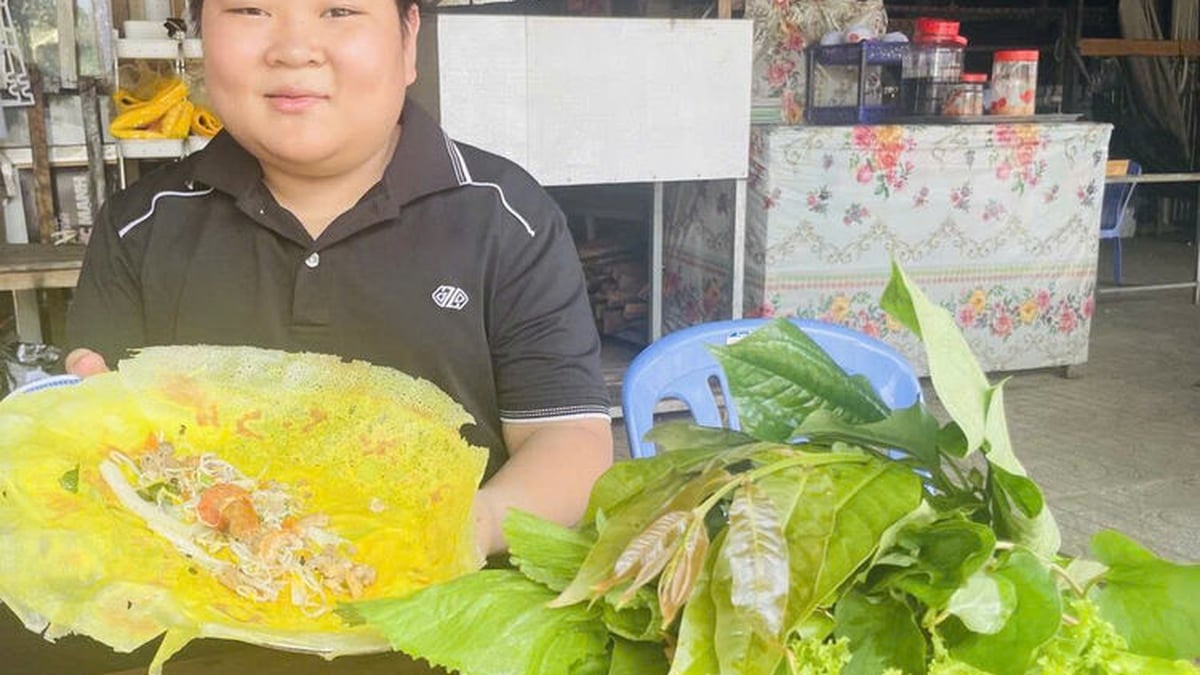

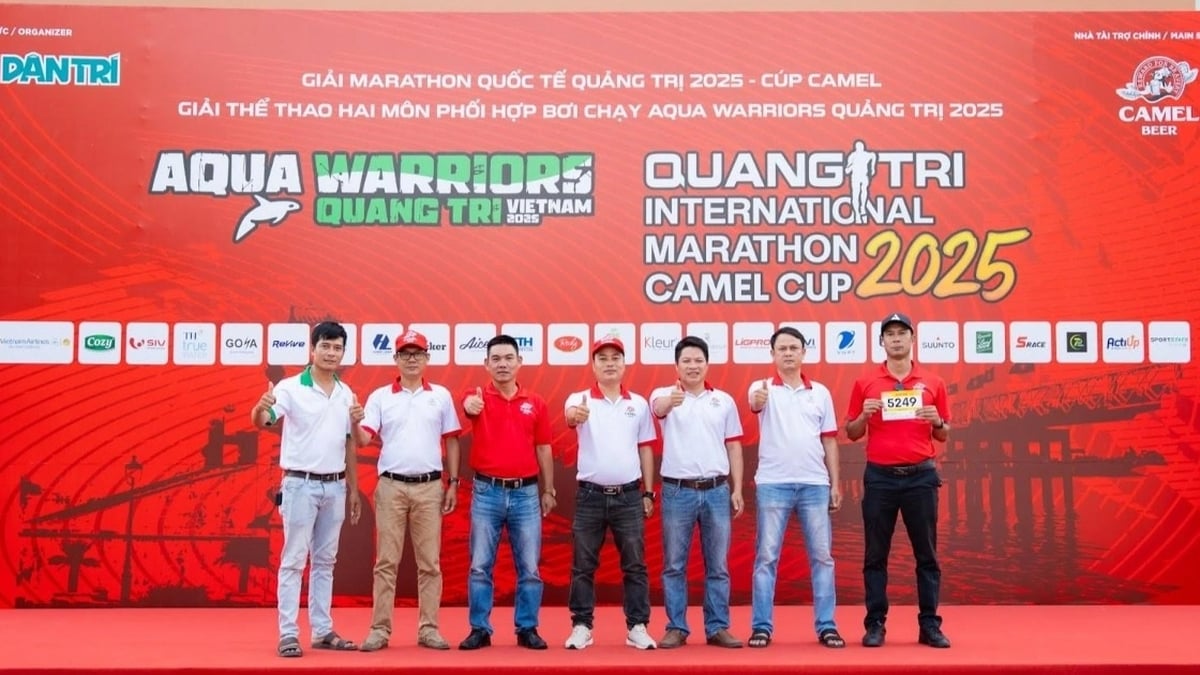
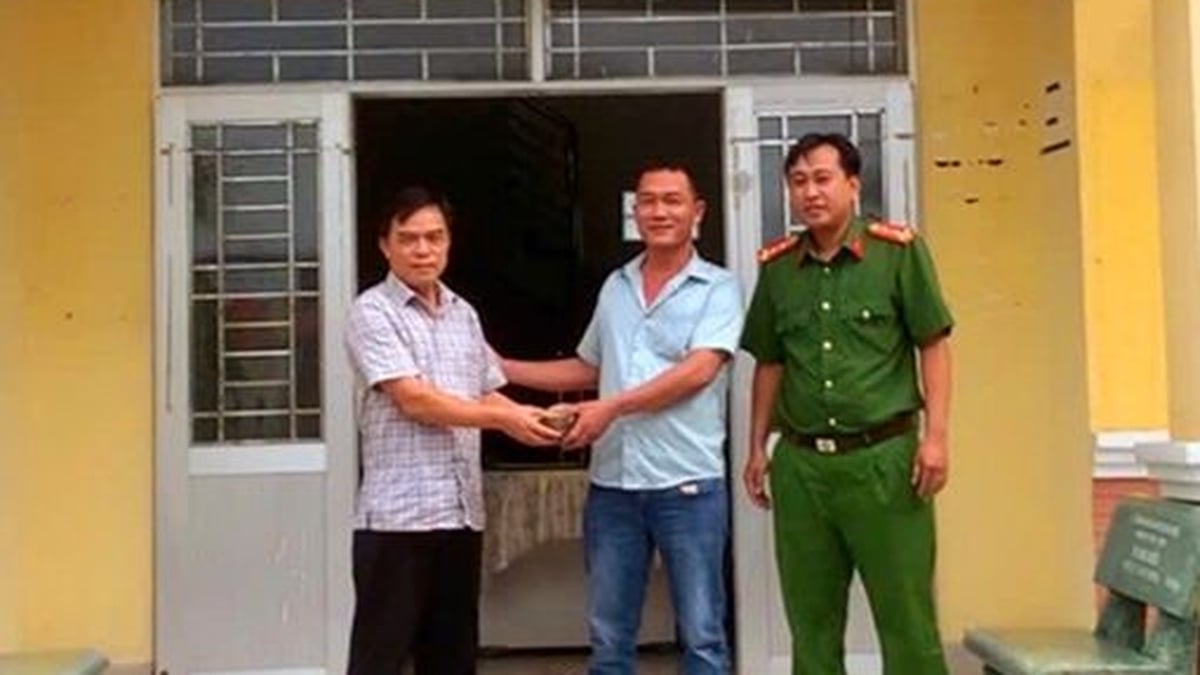























































































Comment (0)